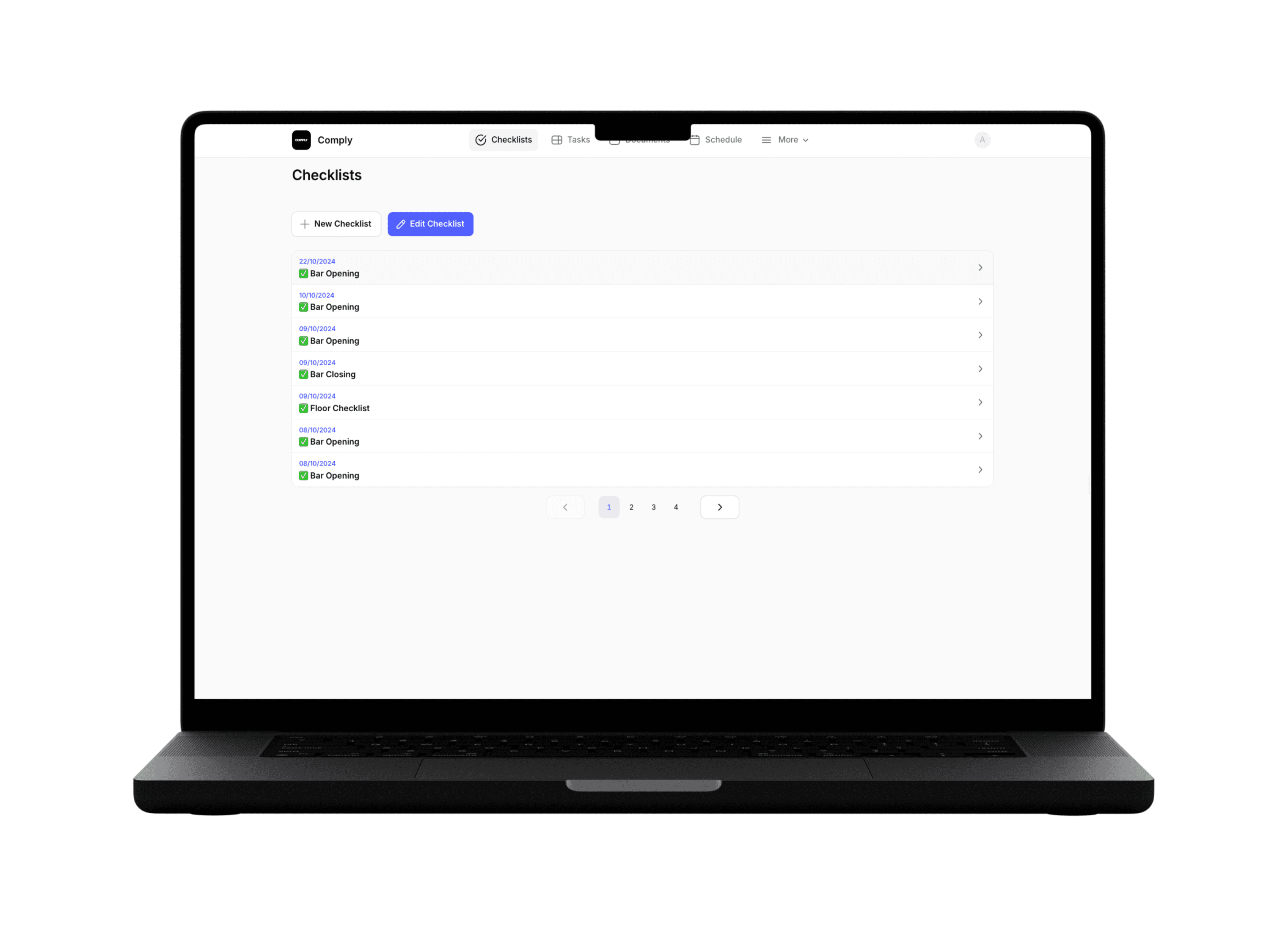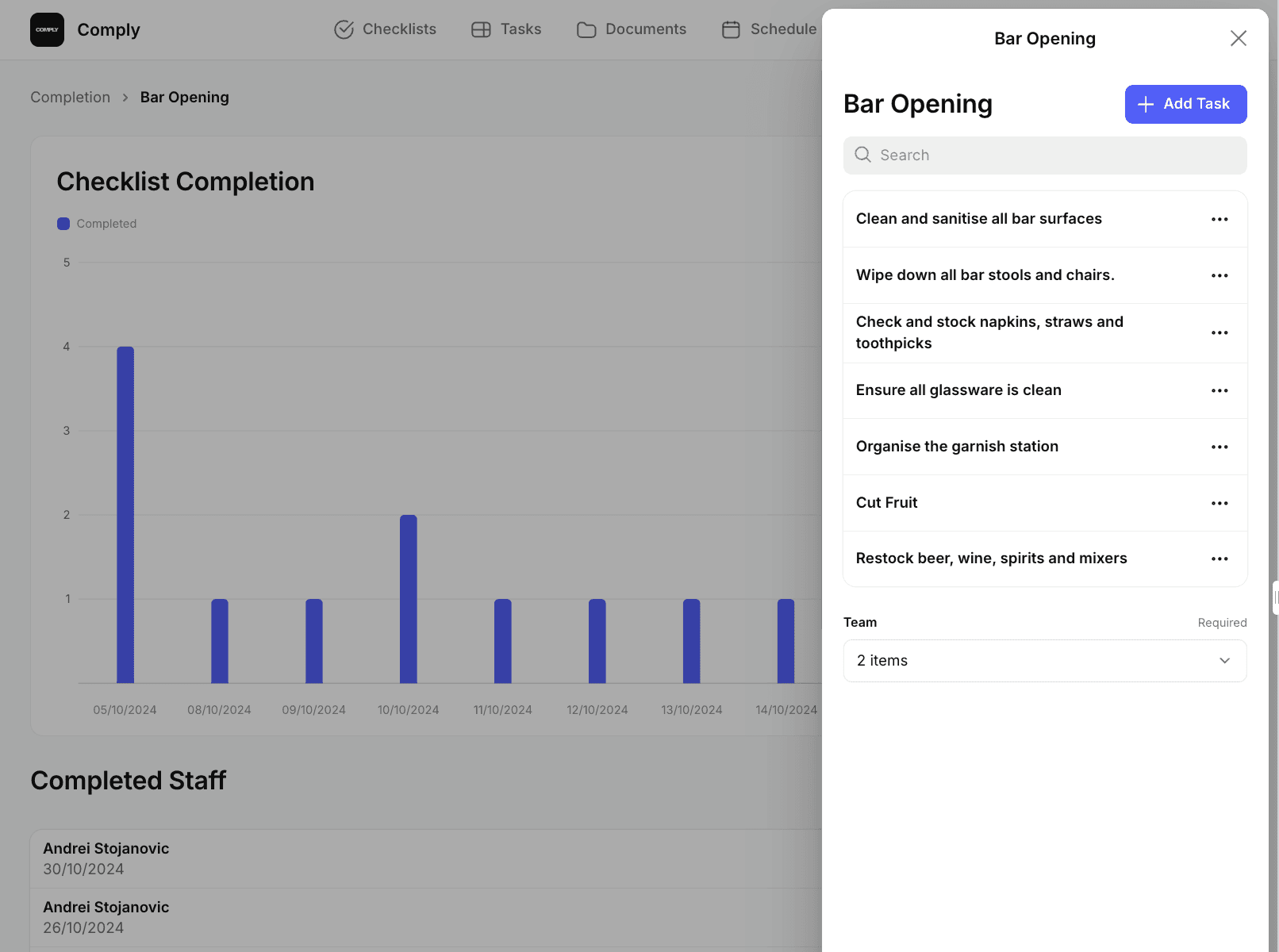What Is the Purpose of a Compliance Management System in Restaurants?
Dec 1, 2024

Compliance isn’t just about avoiding fines or meeting legal requirements—it’s about protecting your business, employees, and customers. In a restaurant, where multiple regulations govern health, safety, and operations, staying compliant can feel like a daunting task.
A Compliance Management System (CMS) simplifies this process by providing a structured approach to meeting regulatory and operational requirements. But what exactly is the purpose of a CMS, and why is it essential for restaurant operations? Let’s explore its goals and benefits in detail.
The Core Purpose of a Compliance Management System
The primary purpose of a Compliance Management System is to ensure that a restaurant operates within the boundaries of applicable laws, regulations, and internal policies. It provides a framework that helps managers monitor, track, and enforce compliance standards, so nothing falls through the cracks.
Beyond simply meeting legal requirements, a CMS is designed to:
Protect the health and safety of customers and staff.
Minimize risks such as fines, lawsuits, and operational disruptions.
Promote consistent, efficient operations.
Build trust with customers and stakeholders.
In essence, a CMS acts as a safety net, ensuring that every aspect of your operation runs smoothly and remains aligned with industry standards.
Protecting Customers and Employees
At its heart, a CMS is about safety. Restaurants have a legal and ethical responsibility to provide a safe environment for their customers and employees. This involves adhering to food safety standards, maintaining proper sanitation, and ensuring workplace safety protocols are followed.
For example, a CMS helps restaurants stay on top of critical tasks like monitoring food storage temperatures, ensuring proper cleaning procedures, and scheduling regular equipment inspections. These systems minimize the risk of foodborne illnesses, accidents, and other issues that could harm your guests or staff.
Minimizing Legal and Financial Risks
One of the most significant purposes of a CMS is to protect your business from the costly consequences of non-compliance. In the restaurant industry, failing to comply with regulations can lead to:
Fines: Health code violations, labor law infractions, or liquor license issues can result in hefty penalties.
Temporary Closures: Serious breaches may require restaurants to shut down temporarily, causing a loss of revenue and reputation.
Lawsuits: Non-compliance with safety standards can lead to legal action from employees or customers.
By centralizing compliance tasks and providing automated reminders, a CMS ensures that critical deadlines, such as renewing licenses or scheduling inspections, are never missed. This proactive approach reduces the likelihood of fines or other penalties.
Streamlining Operations
A CMS isn’t just about rules—it’s about making compliance part of your restaurant’s daily workflow. By integrating compliance tasks into your operations, a CMS helps managers and staff work more efficiently.
For instance, digital checklists allow team members to complete routine tasks, such as sanitation checks, without the need for paper records or manual tracking. Automated alerts remind managers when certifications need to be updated or when it’s time for a fire safety inspection. This integration of compliance into day-to-day operations saves time, reduces stress, and ensures nothing is overlooked.
Promoting Accountability and Consistency
Consistency is vital in the restaurant industry, and a CMS helps ensure that compliance standards are applied uniformly across all areas of your operation. This consistency builds trust, not only among your customers but also within your team.
A CMS assigns specific roles and responsibilities for compliance tasks, making it clear who is accountable for each area. For example, one staff member might be responsible for completing a daily cleaning checklist, while another ensures fire safety equipment is inspected monthly. When everyone knows their role, compliance becomes a shared responsibility rather than a burden.
Building Customer Trust
In a competitive industry, reputation is everything. A restaurant that consistently meets health and safety standards demonstrates reliability and professionalism, earning the trust of its customers.
A CMS plays a significant role in maintaining this trust. By ensuring that food safety protocols, hygiene practices, and other compliance requirements are always met, it reassures customers that their well-being is a top priority. Restaurants that display their compliance efforts—such as certifications or visible cleaning practices—stand out as trustworthy establishments that prioritize quality.
Supporting Continuous Improvement
A CMS is not a one-time solution—it’s a tool for continuous improvement. Regular audits and reviews help identify areas where your restaurant can enhance its operations, whether that’s streamlining workflows, improving training programs, or upgrading equipment.
These insights are invaluable for long-term success. By using the data and feedback provided by a CMS, restaurant managers can make informed decisions that lead to safer, more efficient, and more customer-focused operations.
Conclusion
The purpose of a Compliance Management System goes far beyond ticking boxes on a regulatory checklist. It’s a comprehensive tool that ensures your restaurant operates safely, efficiently, and in alignment with all necessary standards. From protecting your customers and staff to minimizing risks and building trust, a CMS is essential for any restaurant that wants to succeed in today’s competitive landscape.
By integrating a CMS into your operations, you’re not just staying compliant—you’re investing in the long-term success and reputation of your restaurant.



